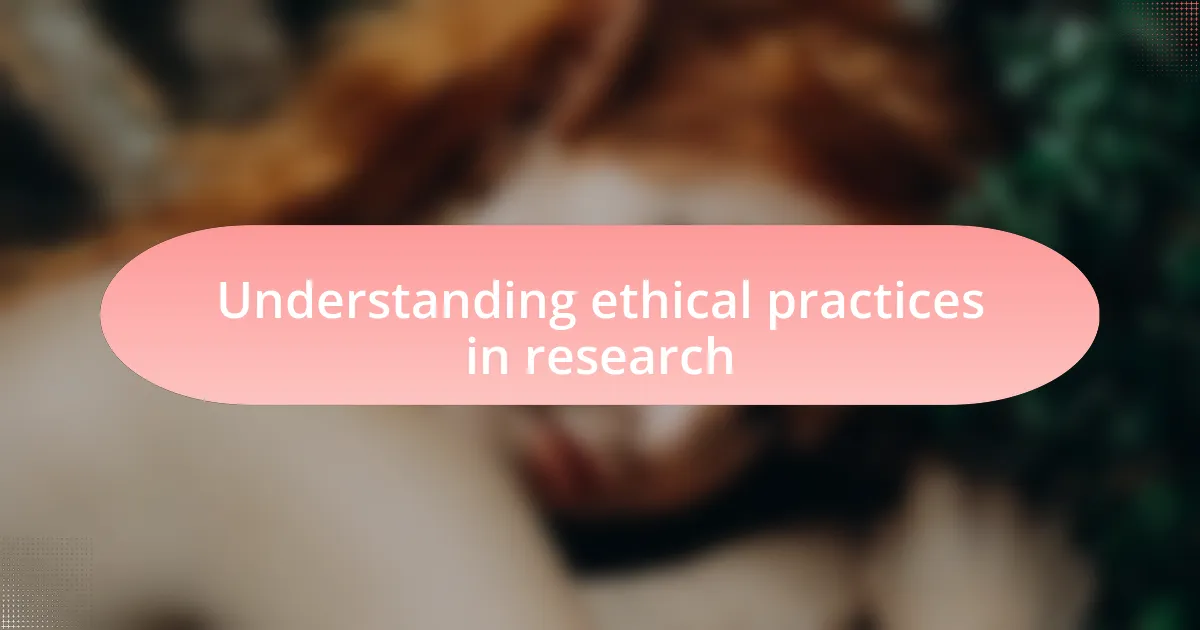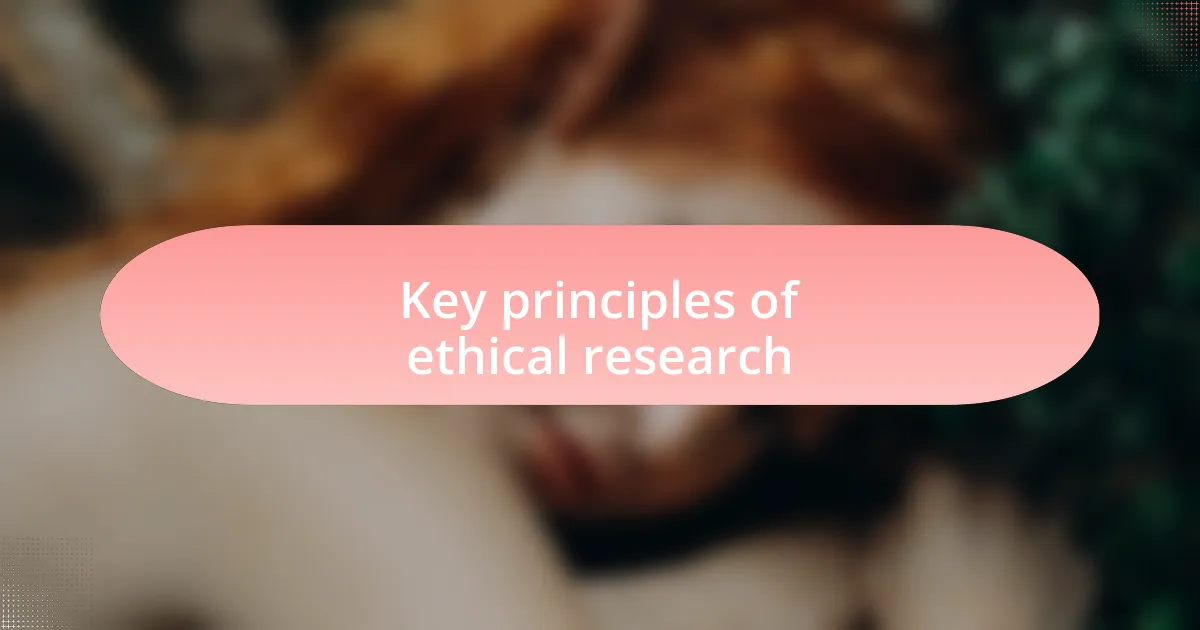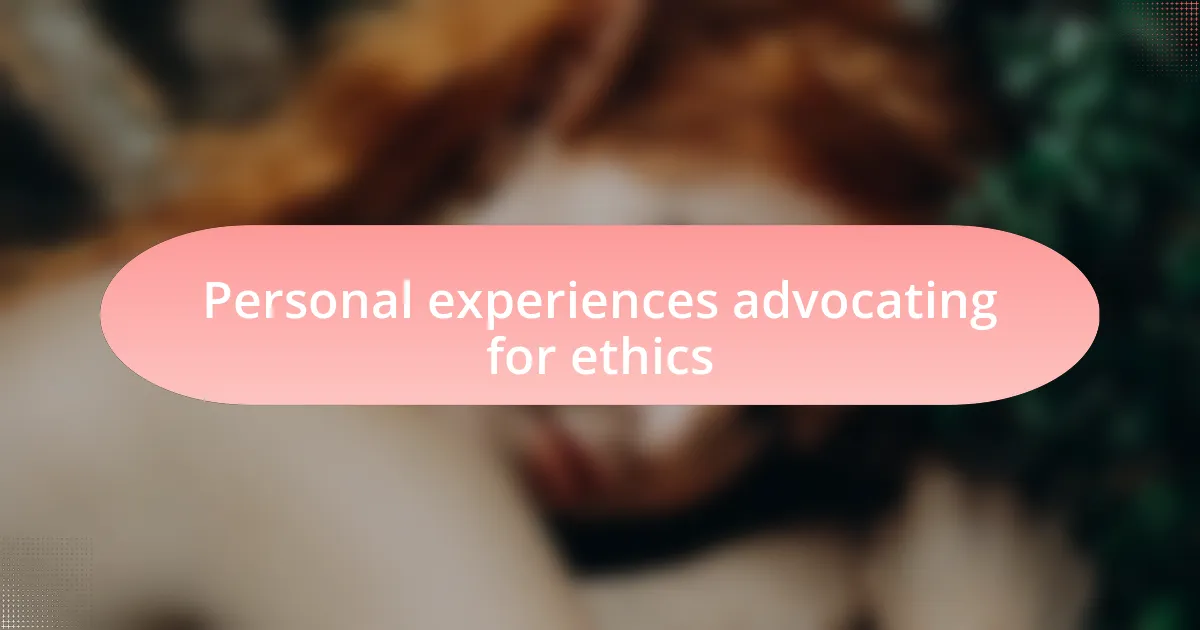Key takeaways:
- Ethical practices in research are crucial for maintaining integrity and trust, emphasizing informed consent and respect for participants.
- Key principles of ethical research include respect for persons, beneficence, and justice, ensuring participants’ autonomy, minimizing harm, and equitable selection.
- Open dialogue, community engagement, and comprehensive training programs are effective strategies for promoting ethical practices among researchers.
- Personal experiences highlight the importance of transparency and collaboration in advocating for ethical considerations in research settings.

Understanding ethical practices in research
Understanding ethical practices in research is fundamental to maintaining integrity and trust in the scientific community. I recall a moment during my early career when I was involved in a study that hinged on informed consent. It struck me how vital it was for participants to fully understand what they were signing up for—no one should feel like a mere statistic.
Ethical practices encompass not just the way we gather data, but how we treat those who provide it. I’ve always asked myself: What would I want if I were in their position? This perspective reminds me that behind every data point, there are real lives and stories, deserving respect and protection throughout the research process.
Moreover, ethical considerations extend to issues of transparency and accountability. During a recent project, we faced a dilemma around data sharing. I felt a deep responsibility to advocate for honesty in reporting, as I couldn’t help but think about how misleading information could affect patient care down the line. Ultimately, ethical practices are not just guidelines; they are the very foundation of responsible research.

Key principles of ethical research
Ethical research is built upon several key principles that guide our actions and decisions as researchers. One principle I’ve always found essential is respect for persons, which emphasizes the need to honor the autonomy and dignity of every participant. For instance, I remember conducting a survey where I had to ensure participants were not only informed but truly understood the implications of their involvement. It was a revelation to see how this respect not only empowered participants but also enriched the data we collected.
Another fundamental principle is beneficence, which compels us to maximize benefits while minimizing harm. Reflecting on my experience with a clinical trial, I realized how crucial it is to weigh the potential risks against the expected outcomes. I often ask myself, “Are we truly acting in the best interest of the subjects?” This introspection challenges me to prioritize the well-being of individuals over the pursuit of knowledge, reinforcing my commitment to ethical research.
Finally, justice plays a vital role in ensuring equitable selection of participants. I vividly recall a project where we were targeting underrepresented communities. It was inspiring to see how much trust and openness blossomed when we took the time to engage with them respectfully. This experience solidified my belief that ethical research not only contributes to scientific advancement but also fosters a sense of community and shared purpose.

Strategies for promoting ethical practices
To promote ethical practices in research, I’ve found that fostering open dialogue among team members is essential. I once participated in a project where weekly meetings allowed us to address any ethical concerns transparently. This atmosphere not only encouraged everyone to voice their opinions but also led to innovative solutions that respected our participants’ rights.
Engaging with the community is another strategy that significantly impacts ethical research. During one study, I collaborated with local leaders to inform the targeted population about our research goals. This connection not only built trust but also helped us to tailor our approach according to their values and traditions. I often reflect, how can we expect participants to engage if they don’t see us as part of their community?
Lastly, adopting comprehensive training programs for all research staff is crucial. I remember attending a workshop focused on ethical dilemmas in research, where we discussed real-life scenarios that forced us to think critically. This experience highlighted for me the importance of preparation in ethical decision-making. It raised the question: if we are not adequately trained, can we truly be trusted to act ethically?

Personal experiences advocating for ethics
One experience that stands out for me was during a clinical trial where I noticed discrepancies in informed consent. It was a tense moment, and I felt a moral obligation to confront the issue. I remember discussing my concerns with the lead investigator, emphasizing that without proper consent, we were undermining participants’ autonomy. It made me wonder, how can we genuinely consider ourselves ethical researchers if we overlook fundamental principles?
In another instance, I had the opportunity to speak with a group of participants about their experiences and feelings throughout the research process. Hearing their stories touched me deeply and reinforced my belief in the importance of transparency. I often think, what if we focused more on our participants as individuals, rather than mere data points? Their insights not only shaped our methodology but also ensured that we remained grounded in ethical practices.
Lastly, I facilitated a session on ethical considerations in our research with colleagues, where we engaged in role-playing different scenarios. This interactive approach not only sparked rich discussions but also created a space for vulnerability. It was enlightening to see how discussing our uncertainties made us all closer and more aware of our collective responsibility. I can’t help but ask, isn’t it through these candid conversations that we truly find the heart of ethical research?

Inspiring others to value ethics
One of my most powerful moments advocating for ethics came during a workshop I led, where participants were asked to share personal experiences related to ethical dilemmas in their research. As stories unfolded, I witnessed a palpable shift in the room; the vulnerability displayed encouraged others to speak up about their own challenges. It made me think: how often do we underestimate the power of shared experiences in valuing ethics? These discussions left an impression on everyone, showing how interconnected our values are.
Another instance that resonates with me is when a colleague approached me after a presentation I gave on ethical research practices. They shared how the session ignited a newfound commitment to ethics in their own projects. Reflecting on that conversation, I realized how inspiring others can create a ripple effect. Isn’t it fascinating how one conversation can plant the seeds of change in someone’s approach and mindset?
I’ve also found value in creating mentorship opportunities focused on ethical research practices. In one instance, I guided a junior researcher as they navigated the complexities of conducting a study responsibly. Watching them develop their own ethical framework was incredibly fulfilling. It left me pondering, how can we cultivate a culture where ethical considerations become integral to the research process, rather than an afterthought?